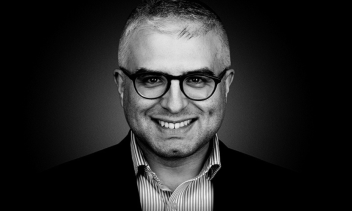“Turn it over and turn it over, for everything is in it” (Pirkei Avot 5:22).
I think of teshuva as a process of turning oneself over, of rereading oneself and in so doing rewriting oneself. The image of a book or ledger which God studies during the days of awe is salient here—for reading involves interpretation as well as selection, the decision to highlight some themes and leave others aside. The partiality of reading, the inherent finitude of perspective, enables re-reading. So, too, our own shortcomings, which are features—not bugs—of our existence, are the condition for our ability to change our minds, hearts, and habits.
In the most basic sense, teshuva is not something we do but something we are. Yet the month of Elul provides a moed, an appointed time, to focus on the dynamism of the human spirit, the longing of the soul, the fundamental incompleteness of life. I think this is one reason we wear the kittel, or death shroud, on Rosh Hashanah and Yom Kippur—accepting death, saying “yes” to our finitude, is the reward we get for the hard work of self-examination. The forgiveness we are extended in response to our desire to be better is the forgiveness that says the point of life is not to complete the work, but simply to engage in it. Of course, we hope that our effort is effective, but how can the framework of efficiency, productivity, and optimization hold up before the great mystery of Being? That is why on the High Holidays we announce that we are mere dust of the earth. After so much penitence, so much introspection, we conclude that ultimately control is not ours, but God’s.
Sometimes, I think of teshuva as akin to the mystical notion of Gelassenheit, coined by Meister Eckhart. Gelassenheit is this paradoxical stance of both being active and being receptive, of both trying and allowing, the perfect balance between egoism and flimsiness. In the process of teshuva, we need to use our selves to transcend ourselves. We need to use our specific experience and story to go beyond our experience and story and develop a new experience and a new story.
On Pesach, we celebrate the Exodus from Egypt, a national, historical, and political story of freedom. On Rosh Hashanah, we celebrate the Exodus of the Soul from the Egypt of tyrannical habits and oppressive mental loops. Genuine transformation is the parting of the otherwise blocked sea. Most Jews did not leave Egypt, and most of us most of the time do not want to leave our old ways behind. The unknown is often more terrifying than the known, no matter how bad the known is. Say what you want about the boring job, the miserable addiction, the lacerating inner voice—at least they are consistent. Who will be if we change? Are our sufferings dear to us? Only when we can say “neither they nor their reward” will we venture into the sea and sing a new song.
Rabbi Abahu bar Zeira said: Great is Repentance, for it preceded the Creation of the World, as it says, “Before the mountains were born…You reduced Man to nothingness, and said ‘Repent’” (Psalms 90:2-3).
A philosophical way to take the teaching that repentance precedes Creation is that it is the condition that makes possible the human experience of anything like a world. Transcendental philosophy is the philosophy concerned with the “conditions of possibility” for X. So, Kant asked what was needed for human consciousness and concluded that we couldn’t think or perceive at all unless we had a sense of our own freedom, autonomy, and obligation to a universal moral law. Heidegger asked what was needed for “being-in-the-world” and concluded that we couldn’t exist unless we were structured fundamentally by care, which is in turn connected to a sense of our own finitude. Levinas took the face of another person before me, imposing a sense of ethical responsibility on me, as the precondition for my ability to think anything at all.
The idea that repentance precedes Creation is only shocking if you think of teshuva in the narrow sense. After all, no sin has been committed, so why would we need a ritual for atonement? But if you translate teshuva, here, as the ability to aspire, the text is phenomenologically insightful. A world without aspirational beings would not be a world.
I like the idea of teshuva as aspiration because it broadens our aperture from thinking about specific things we’d like to fix or improve and focuses our attention on the kind of people we’d like to be, the kind of lives we’d like to live, and, to say it more religiously, the kind of service we’d like to perform.
Tactics are downstream of strategy. Once you know who you’d like to be, it’s much easier to set goals. But how do we know what strategy to set? From a mainstream, religious point of view, the tactical question is “How do I transgress less and do more mitzvot?” But from an existentialist point of view, that set of questions doesn’t address the soul-question: “Who am I called to be? Where should I give my energy?” Such questions, in my view, exceed halacha—they can’t be answered in a psak. They are the kinds of questions that economist Russ Roberts in his new book calls “Wild Problems.”
“Wild Problems” are problems of identity rather than problems of achievement. Wild Problems are problems born from the fact that we cannot clone ourselves and run the simulation an infinite number of times living out all possible lives. Instead, we must choose what to do with our one life. There is no going back.
Ironically, teshuva is sometimes translated as return. Maimonides makes famous the idea of returning to the original crime scene, by finding yourself in the exact same position to sin—and refusing to do it. For example, you said the mean thing at dinner you now regret. But how identical are we talking? Can you actually go to the same spot with the same people and do it over? Even if you could recreate the scene you would not be the same people—you would be people for whom time has passed, and life has moved on. You would be people who, as Kierkegaard describes in his essay “Repetition,” are repeating the dinner. Thus, no scene is ever identical to another, even when it tries to be. I was reminded of this insight recently while watching Nathan Fielder’s new show, The Rehearsal. The conceit of the show is a kind of teshuva in reverse: to prepare for a difficult conversation, Fielder has his contestants practice under conditions intended to be just like the real thing. Of course, there are always hiccups. The rehearsal, it turns out, is part of life, not before or outside of it. The illusion of the rehearsal is the illusion that we might pause our lives and replay them again and again until we find the right answer. But the human condition is structured as a series of irreversible portals.
There is a midrash I love that says “Chadesh yameinu k’kedem”—renew our days as of old—actually means not that we long to return to Eden, mikedem gan Eden, East of Eden. We can never go back to Eden, only to the place just outside. Teshuva isn’t nostalgia. Teshuva is the redemption of the past, with all of its errors, through the realization that the past isn’t just what happened, but also how we remember it and integrate it now. Teshuva is rereading the book you love and finding something new. It’s rereading the book you used to find dull and realizing it is wise. It’s reading the book you used to love and discovering that you have changed and no longer need it. Teshuva is wholesome alienation, a most broken-hearted integrity.
The difficulty of defining teshuva is connected to the difficulty of living in time. How can we define that which constitutes us? Whether you think of time as duration (Bergson), or as ecstasy (Heidegger), or as relativity (Einstein), it is like the face of God—we cannot know the essence of time directly and live. Thus, contemplatives seek to make themselves as close to death as possible to discern the mystery of time.
Meister Eckhart says the eye with which I see God is the eye with which God sees me. Teshuva may be this eye through which we see God and find that God looks back at us.
Zohar Atkins is a rabbi, poet, scholar, and blogger. He writes at What Is Called Thinking and Etz Hasadeh and hosts soulful conversations about the meaning of life with leading thinkers and artists at Meditations with Zohar.








